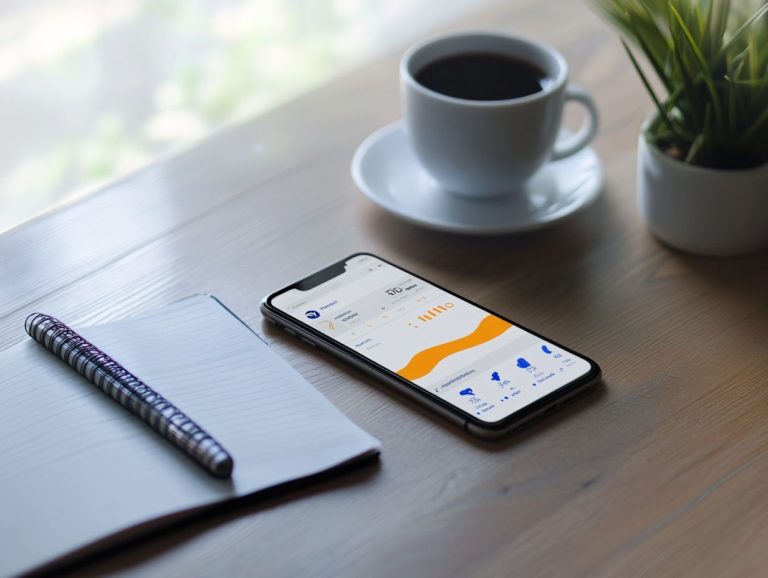The Role of Budgeting in Debt Reduction
Managing debt may seem daunting. However, effective budgeting serves as a powerful ally in regaining control over your finances.
Understanding the relationship between budgeting and debt reduction is crucial for anyone looking to improve their financial well-being. This guide will help you create a personalized budget and provide you with valuable tools, strategies, and tips to stay committed to your plan.
This guide will also explore different ways to reduce debt and show you how to monitor your progress effectively. With the right approach, you can chart a course toward financial freedom.
Contents
Key Takeaways:

- Budgeting helps reduce debt and improve financial stability.
- Creating and sticking to a budget requires discipline and the use of various tools and strategies.
- Regularly monitoring and adjusting your budget is essential for tracking progress and making necessary changes in your debt reduction journey.
The Importance of Budgeting for Debt Reduction
Budgeting is essential for reducing debt and enhancing your financial situation. It allows you to understand your spending habits, set clear savings goals, and allocate funds for debt repayment effectively.
A well-structured budget not only helps you track your expenses but also prepares you for unexpected costs. This is money set aside for unexpected expenses, like car repairs or medical bills. This foundation ultimately paves the way for a debt-free future.
Take control of your financial future! By understanding the importance of budgeting, you can make informed decisions about your expenditures.
Understanding the Relationship Between Budgeting and Debt
The connection between budgeting and debt is strong. Effective budgeting is your essential tool for managing debt and achieving your financial goals.
By carefully tracking your spending and monitoring your expenses, you can gain a clearer understanding of your financial landscape. This makes it easier to identify areas that need adjustment. This awareness helps develop good money habits, encouraging timely debt repayments and significantly lowering the risk of accumulating additional debts.
Creditors notice when you prioritize budgeting; a well-structured financial plan can open doors for negotiating better terms or exploring potential debt consolidation options. Ultimately, effective budgeting gives you the power to stay on top of your payments and enhances your overall financial health, equipping you to navigate difficult economic situations with confidence.
Creating a Budget for Debt Reduction
Creating a budget for debt reduction requires a thorough examination of your financial landscape. Start by identifying all your sources of income, then categorize your expenses clearly.
This structured approach ensures that a dedicated portion of your monthly income is consistently directed toward reducing debt, whether it s from credit cards, personal loans, or other financial obligations.
Steps to Creating an Effective Budget
To create an effective budget, follow these thoughtful steps: track your spending, categorize your expenses, and determine how much to allocate for each category, especially for high-interest debt repayment.
Start by carefully tracking your daily expenses. This not only helps you understand your spending habits but also lays the groundwork for categorizing those expenses into fixed and variable costs. This clarity allows you to establish limits for discretionary spending, ensuring that your essentials are prioritized first.
As your income changes, reviewing your budget monthly becomes essential. This allows you to adjust allocations for any unforeseen expenses, such as medical bills or repairs. This flexible approach to budgeting helps you stay on track toward your financial goals while effectively managing your debt.
Ready to take charge? Let s dive into budgeting!
With persistence and a clear budget, you can achieve the financial stability you deserve!
Tools and Strategies for Budgeting

Harnessing tools and strategies for budgeting is vital in today s financial landscape. A range of apps and resources can help you refine your budgeting processes and track your financial goals.
Utilizing Technology and Other Resources
Technology plays a crucial role in budgeting today. It offers resources that empower you to make informed decisions about your spending and saving.
With mobile apps designed for budgeting, you can track your expenses in real-time. You can categorize your spending and set savings goals right from your smartphone.
Online calculators simplify financial planning. They help you project future expenses and assess your financial health.
Websites dedicated to finance provide valuable insights and a supportive community. By using these tools, you streamline your financial management and improve your financial literacy.
Sticking to Your Budget
Sticking to your budget is essential for achieving your financial goals. It requires discipline and a focused approach to managing your spending.
Tips for Maintaining Discipline and Avoiding Temptations
To stay disciplined and avoid distractions, cultivate strong spending habits. Keep your financial goals in sharp focus.
Create a detailed spending plan that outlines your income and expenses. This gives you a clearer view of your finances.
Establishing an emergency fund is crucial. It serves as a safety net against unexpected expenses.
Regularly review your budget for better accountability. Surround yourself with a support system of family and friends who understand your goals.
Debt Reduction Methods
Debt reduction is vital for managing and eliminating debt. Strategies like the debt snowball and debt avalanche can guide you to financial freedom.
Exploring Different Approaches to Paying Off Debt

When considering strategies for paying off debt, look at methods like the debt snowball and debt avalanche. Each has advantages suited to your financial situation.
The debt snowball method suggests paying off smaller debts first. This can lead to quick wins that build your motivation.
In contrast, the debt avalanche strategy targets debts with the highest interest rates. This can save you money over time.
Think about your financial situation, including your debts and what motivates you to choose the best strategy for your financial freedom.
Monitoring and Adjusting Your Budget
Monitoring and adjusting your budget is vital for staying aligned with your financial goals. This ongoing process helps you focus and adapt as your finances change.
Start reviewing your budget today! Small adjustments can lead to big changes in your financial health.
How to Track Progress and Make Necessary Changes
Track your progress with ease! To adjust your budget effectively, establish a routine for reviewing your spending and assessing your financial situation.
You can make this routine straightforward by dedicating time each week to log your expenses whether through user-friendly budgeting apps or well-organized spreadsheets. These tools not only categorize your spending but also help you visualize patterns that may require your attention.
As you review your financial records, pinpoint areas where adjustments may be needed, like recurring subscriptions that could be seen as unnecessary or overspending in specific categories. Cut those unnecessary expenses now to boost your savings! By making these changes, you can significantly impact your monthly payments and enhance your overall financial health, leading to increased savings and reduced financial stress.
Frequently Asked Questions
What is the role of budgeting in debt reduction?
The role of budgeting in debt reduction is to help individuals and households create a plan for managing financial resources more effectively. By creating a budget, individuals can track their income and expenses, identify areas to cut back, and allocate funds towards paying off their debts.
How does budgeting help with debt reduction?

Budgeting helps with debt reduction by providing a clear picture of one’s financial situation. It allows individuals to prioritize expenses and allocate funds toward paying off their debts. By identifying unnecessary expenses and cutting back on them, individuals can free up more money for their debt payments.
Can budgeting alone eliminate debt?
No, budgeting alone cannot eliminate debt. It is an essential tool for managing and reducing debt, but it requires discipline and consistency. Other strategies, like increasing income and negotiating with creditors, may also be necessary to eliminate debt completely.
What are some tips for budgeting to reduce debt?
Some tips for budgeting to reduce debt include setting realistic goals, tracking expenses, cutting back on discretionary spending, and allocating a portion of income toward debt payments. Regularly reviewing and adjusting the budget is also essential to ensure it effectively meets debt reduction goals.
How can budgeting prevent individuals from getting into debt?
Budgeting can prevent individuals from getting into debt by promoting responsible spending habits. By setting a budget and tracking expenses, individuals can avoid overspending and accumulating unnecessary debt. It also allows individuals to save money and build an emergency fund, preventing reliance on credit during financial hardships.
Is it necessary to stick to a strict budget for debt reduction?
While it is essential to follow a budget to effectively reduce debt, strict adherence is not necessary. Allow for some flexibility and adjust the budget as needed, but stay disciplined and consistent in following the overall budget plan to achieve debt reduction goals.






